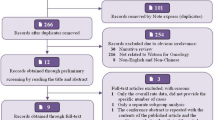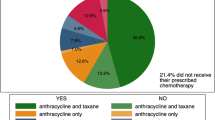Abstract
The Watson for Oncology (WFO) decision system has been rolled out in many cancers. However, the consistency of treatment for breast cancer is still unclear in relatively economically disadvantaged areas. Patients with postoperative adjuvant stage (January 2017 to December 2017) and advanced-stage breast cancer (January 2014 to December 2018) in northwest of China were included in this study. Patient information was imported to make treatment decisions using Watson version 19.20 analysis and subsequently compared with clinician decisions and analyzed for influencing factors. A total of 263 patients with postoperative adjuvant breast cancer and 200 with advanced breast cancer were included in this study. The overall treatment modality for WFO was in 80.2% and 50.5% agreement with clinicians in the adjuvant and advanced-stage population, respectively. In adjuvant treatment after breast cancer surgery, menopausal status (odds ratio (OR) = 2.89, P = 0.012, 95% CI, 1.260–6.630), histological grade (OR = 0.22, P = 0.019, 95% CI, 0.061–0.781) and tumor stage (OR = 0.22, P = 0.042, 95% CI, 0.050–0.943) were independent factors affecting the concordance between the two stages. In the first-line treatment of advanced breast cancer, hormone receptor status was a factor influencing the consistency of treatment (χ2 = 14.728, P < 0.001). There was good agreement between the WFOs and clinicians' treatment decisions in postoperative adjuvant breast cancer, but poor agreement was observed in patients with advanced breast cancer.

Similar content being viewed by others
References
Sung H, Ferlay J, Siegel RL, Laversanne M, Soerjomataram I, Jemal A, et al. Global cancer statistics 2020: GLOBOCAN estimates of incidence and mortality worldwide for 36 cancers in 185 countries. CA Cancer J Clin. 2021. https://doi.org/10.3322/caac.21660.
Loibl S, Poortmans P, Morrow M, Denkert C, Curigliano G. Breast cancer. Lancet. 2021;397:1750–69. https://doi.org/10.1016/s0140-6736(20)32381-3.
Curioni-Fontecedro A. A new era of oncology through artificial intelligence. ESMO Open. 2017. https://doi.org/10.1136/esmoopen-2017-000198.
Esteva A, Kuprel B, Novoa RA, Ko J, Swetter SM, Blau HM, et al. Dermatologist-level classification of skin cancer with deep neural networks. Nature. 2017;542:115–8.
Choi YI, Chung J, Kim KO, Kwon KA, Kim YJ, Park DK, et al. Concordance rate between clinicians and Watson for oncology among patients with advanced gastric cancer: early, real-world experience in Korea. Can J Gastroenterol Hepatol. 2019;2019:1–6.
Lim S, Lee K-B. Use of a cognitive computing system for treatment of cervical cancer. J Gynecol Oncol. 2017;28:e67.
Aocnp D. Watson will see you now: a supercomputer to help clinicians make informed treatment decisions. Clin J Oncol Nurs. 2015;19:31.
McGuire S. World cancer report 2014. Geneva, Switzerland: World Health Organization, international agency for research on cancer, WHO Press, 2015. Adv Nutr. 2016;7:418–9.
Lei W, Duan R, Li J, Liu X, Huston A, Boyce BF, et al. The IAP antagonist SM-164 eliminates triple-negative breast cancer metastasis to bone and lung in mice. Sci Rep. 2020;10:1–13.
Weigelt B, Peterse JL, Van’t Veer LJ. Breast cancer metastasis: markers and models. Nat Rev Cancer. 2005;5:591–602.
Rodriguez-Ruiz A, Lång K, Gubern-Merida A, Broeders M, Gennaro G, Clauser P, et al. Stand-alone artificial intelligence for breast cancer detection in mammography: comparison with 101 radiologists. JNCI: J Natl Cancer Inst. 2019;111:916–22.
Xu J, Yang P, Xue S, Sharma B, Sanchez-Martin M, Wang F, et al. Translating cancer genomics into precision medicine with artificial intelligence: applications, challenges and future perspectives. Hum Genet. 2019;138:109–24.
Kempowsky-Hamon T, Valle C, Lacroix-Triki M, Hedjazi L, Trouilh L, Lamarre S, et al. Fuzzy logic selection as a new reliable tool to identify molecular grade signatures in breast cancer–the INNODIAG study. BMC Med Genomics. 2015;8:1–17.
Beck AH, Sangoi AR, Leung S, Marinelli RJ, Nielsen TO, Van De Vijver MJ, et al. Systematic analysis of breast cancer morphology uncovers stromal features associated with survival. Sci Trans Med. 2011;3:108ra113-108ra113.
Song SE, Seo BK, Cho KR, Woo OH, Son GS, Kim C, et al. Computer-aided detection (CAD) system for breast MRI in assessment of local tumor extent, nodal status, and multifocality of invasive breast cancers: preliminary study. Cancer Imaging. 2015;15:1–9.
Kim M-S, Park H-Y, Kho B-G, Park C-K, Oh I-J, Kim Y-C, et al. Artificial intelligence and lung cancer treatment decision: agreement with recommendation of multidisciplinary tumor board. Trans Lung Cancer Res. 2020;9:507.
Tian Y, Liu X, Wang Z, Cao S, Liu Z, Ji Q, et al. Concordance between Watson for oncology and a multidisciplinary clinical decision-making team for gastric cancer and the prognostic implications: retrospective study. J Med Internet Res. 2020;22:e14122.
Yao S, Wang R, Qian K, Zhang Y. Real world study for the concordance between IBM Watson for oncology and clinical practice in advanced non-small cell lung cancer patients at a lung cancer center in China. Thoracic Cancer. 2020;11:1265–70.
McNamara DM, Goldberg SL, Latts L, Atieh Graham DM, Waintraub SE, Norden AD, et al. Differential impact of cognitive computing augmented by real world evidence on novice and expert oncologists. Cancer Med. 2019;8:6578–84.
Somashekhar S, Sepúlveda M-J, Puglielli S, Norden A, Shortliffe E, Kumar CR, et al. Watson for oncology and breast cancer treatment recommendations: agreement with an expert multidisciplinary tumor board. Ann Oncol. 2018;29:418–23.
Zhou N, Zhang C, Lv H, Hao C, Li T, Zhu J, et al. Concordance study between IBM Watson for oncology and clinical practice for patients with cancer in China. Oncologist. 2019;24:812–9.
Xu F, Sepúlveda M-J, Jiang Z, Wang H, Li J, Yin Y, et al. Artificial intelligence treatment decision support for complex breast cancer among oncologists with varying expertise. JCO Clin Cancer Inform. 2019;3:1–15.
You H-S, Gao C-X, Wang H-B, Luo S-S, Chen S-Y, Dong Y-L, et al. Concordance of treatment recommendations for metastatic non-small-cell lung cancer between Watson for oncology system and medical team. Cancer Manag Res. 2020;12:1947.
Funding
This work was supported by grants from the Watson for Oncology artificial intelligence-assisted decision-making system for the clinical management of breast cancer (Xinlan Liu). The sponsors played no role in the study design, data collection, analysis, or decision to submit the article for publication.
Author information
Authors and Affiliations
Contributions
Drs LY, Huo, ZJ, LX contributed to the conception and the drafting of manuscripts. Drs Zhao F, Liu X are responsible for coordinating and participating in the article revision. All authors read and approved the final manuscript. Drs LY and Huo contributed equally to this work and are co–first authors. Concept and design: ZJ, LX. Acquisition, analysis, or interpretation of data: Huo, LY. Drafting of the manuscript: Huo, LQ. Critical revision of the manuscript for important intellectual content: All authors. Statistical analysis: LQ, LY. Obtained funding: All authors. Administrative, technical, or material support: All authors. Supervision: All authors. All authors contributed to the article and approved the submitted version.
Corresponding authors
Ethics declarations
Conflict of interest
The authors declare that they have no competing interests.
Additional information
Publisher's Note
Springer Nature remains neutral with regard to jurisdictional claims in published maps and institutional affiliations.
Rights and permissions
Springer Nature or its licensor holds exclusive rights to this article under a publishing agreement with the author(s) or other rightsholder(s); author self-archiving of the accepted manuscript version of this article is solely governed by the terms of such publishing agreement and applicable law.
About this article
Cite this article
Liu, Y., Huo, X., Li, Q. et al. Watson for oncology decision system for treatment consistency study in breast cancer. Clin Exp Med 23, 1649–1657 (2023). https://doi.org/10.1007/s10238-022-00896-z
Received:
Accepted:
Published:
Issue Date:
DOI: https://doi.org/10.1007/s10238-022-00896-z




